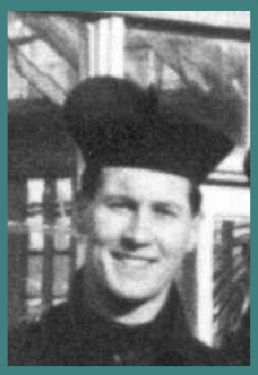
Confrater Bernard (Ryan,) C.P.
WITH profound sorrow we chronicle the death of Confrater Bernard Of Jesus and Mary which took place on February 3rd, 1941. It is only when death claims one who stands upon the threshold of life that. we appreciate to the full its tragic significance. Particularly is this the case with one who is a student for the priesthood. The thousand golden dreams of youth are abruptly shattered, the splendid promise of a future, filled with unselfish service for the souls of others can never know fulfilment. By all human reckoning life would have seemed the better gift, but Divine Providence disposed otherwise – and realising that “to those who love God all things work together unto good” – we can only bow our heads in acquiescence.
Known in the world as Patrick Ryan, Confrater Bernard was born at Rathgar, Dublin, in 1919. He received his education from the Christian Brothers at Synge Street, Dublin, where his outstanding ability gave rich promise for his future career. Even thus early he had distinguished himself amongst his fellows, for he succeeded in obtaining the coveted Gold Medal award for elocution at the Feis towards the end of his school days. His piety and devotion turned his thoughts towards the religious life, and in 1937 he sought admission to the Passionist Congregation. Having successfully completed his year of probation, he made his religious profession at St. Gabriel’s Retreat, Enniskillen, on January 23rd, 1938. Subsequently he was transferred to St. Paul’s Retreat, Mount Argus, to commence his studies for the priesthood.
HIS life in religion was brief, yet in him was fulfilled the apposite comment of the Book of Wisdom: “Venerable old age is not that of a long time, nor counted by the number of years: but the understanding of a man is grey hairs, and a spotless life is old age” (iv, 8, 9). A devoted and painstaking student, he devoted all his efforts to the faithful discharge of the duties that made up his daily life. Quiet and retiring in disposition, his manifest fervour gave edification to his companions. When stricken down by illness, he never allowed himself a word of complaint or impatience, but resigned himself entirely to God’s Will. As the weeks passed by it was evident that he could not hope to be restored to health. Despite the most devoted care, and attention he grew weaker day by day; the Last Sacraments were administered to him, and the short time that remained be devoted to preparing for the end which now seemed inevitable. In the afternoon of February 3rd, God called him to Himself. R. I. P.
(The Cross, VOL XXXI, 1940-41; p.480)